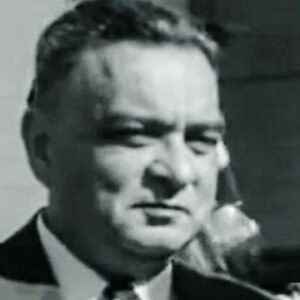Iskander Mirza was a well-known politician who witnessed the division of India and Pakistan when it was still a British colony. Iskander Mirza’s political and historical expertise is consequently presumed to be wide. His political engagements and administrative skills were crucial to his political success. Throughout his career, he was assigned to several positions and never failed to fulfill his responsibilities. With each new position he had, his career as a leader reached new heights. There was a lot of volatility in the country under his presidency, and the country saw four Prime Ministers elected in a short period of time. He even introduced martial law in Pakistan for the first time and met the Military Chief, Ayub Khan. Some believe that the introduction of martial law is to blame for the chaos that has erupted in Pakistan. Iskander craved authority and attempted to rule his kingdom. Mirza conspired against the martial administrator because he was afraid of losing power as president to Ayub Khan. Unfortunately, the former president was a victim of the martial regime he had imposed himself. As a result, some shortcomings and poor decisions contributed to his collapse. He was compelled to live a life devoid of honor once his term as President of Pakistan came to an end.
Childhood and Adolescence
Mirza was born in a noble family in the late 1890s in the Murshidabad district of Bengal, then a part of British India, to Sahibzada Sayyid Muhammad Fateh Ali Mirza and Dilshad Begum.
His father was a descendant of Nawab Mansur Ali Khan, Bengal’s last Nawab.
He attended ‘Elphinstone College’ in Bombay (now Mumbai) before moving to England to continue his education at the ‘Royal Military Academy’ in Sandhurst. In 1920, he returned to India after finishing his study in England and was posted to the ‘British Indian Army.’
Iskander Mirza’s Career
Mirza enlisted in the army on July 16, 1920, and served until July 16, 1922. He was a member of the ‘Cameronians battalion and took part in the ‘Khodad Khel Operations as well as the ‘Waziristan War.’ He was afterward sent as an Army Inspector to the ’17th Poona Horse’ unit.
In 1926, he left the ‘British Indian Army’ and joined the ‘Indian Political Service’ as a ‘northwest Frontier Province Assistant Commissioner.’
In the early 1930s, he was appointed as the District Officer and remained in that position for a few years.
He served as the Political Agent for the tribal areas between 1938 and 1945. He later spent a year as the Political Agent for the ‘northwest Frontier Province’ and Odisha regions.
In 1946, he returned to the ‘Ministry of Defence of British India as the Joint Defence Secretary, with the task of dividing the ‘British Indian Army’ into two armies, India and Pakistan.
Mirza was selected as Pakistan’s Defense Secretary after the country’s independence.
He was appointed Governor of East Pakistan in 1954 in an attempt to bring calm to the country’s volatile climate by announcing the governor’s rule.
Due to the ill health of then-Governor General Ghulam Mohammad, Mirza was appointed to the position the next year as the most qualified candidate.
Since the newly constituted Pakistani Constitution replaced the Governor General’s office with the President of Pakistan, Iskandar Mirza became the country’s first President in 1956.
The country experienced a lot of instability during his presidency, and martial law, which he enforced, is claimed to be the cause of it.
Achievements and Awards
This political figure was awarded the ‘India General Service Medal’ in 1909.
In 1935, he was awarded the ‘King George V Silver Jubilee Medal,’ and two years later, the ‘King George VI Coronation Medal.’
This former Pakistani President was made a “Officer of the Order of the British Empire” in 1939.
Iskander Mirza was awarded the ‘Companion of the Order of the Indian Empire’ in 1945.
After Pakistan attained independence in 1948, he was also awarded the ‘Pakistan Independence Medal.’
This renowned leader received the ‘Queen Elizabeth II Coronation Medal’ in 1953.
President Mirza was awarded the ‘Grand Collar of the Order of Pahlavi’ by the Iranian Empire in 1956.
He was awarded the ‘Order of the Supreme Sun’ by the Kingdom of Afghanistan in 1958.
Personal History and Legacy
On November 24, 1922, Iskander Mirza married Rifaat Begum, and the couple had six children, including four daughters and two sons.
Humayun Mirza, one of his sons, wrote the book “From Plassey to Pakistan: The Family History of Iskander Mirza.”
In 1954, this Pakistani leader married Naheed Amirteymour, the daughter of Iranian Statesman Amirteymour Kalali, an aristocratic lady.
President Iskander Mirza was forced to resign from his presidency on October 27, 1958, and was afterward exiled to London. He is thought to have spent the rest of his life in a London hotel room. His main source of money was a meager annual pension, thus he lived in poverty there. Friends and close acquaintances assisted him in surviving in London.
Mirza passed away in a hospital in London in November 1969. Yaksha Khan, Pakistan’s then-President, refused to allow him to be buried there. Following this, Iran’s king, Shah Mohammad Reza Pahlavi, had former President Mirza’s remains transferred from London to Tehran, where his final funeral rites were carried out with dignity.
Estimated Net worth
Iskander is one of the wealthiest World Leaders and one of the most popular. Iskander Mirza’s net worth is estimated to be $1.5 million, according to Wikipedia, Forbes, and Business Insider.
Trivia
According to certain historical evidence, this prominent statesman died on the same day he was born.


